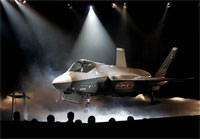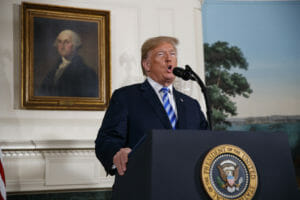Inside the Military-Industrial Complex
Former Assistant Secretary of Defense Philip Coyle knows a thing or two about the "staggering" amounts of money the U.S. funnels into the military-industrial complex, and why it is so difficult to stanch the profiteering.
James Harris and Josh Scheer
Former Assistant Secretary of Defense Philip Coyle knows a thing or two about the “staggering” amounts of money the U.S. funnels into the military-industrial complex, and why it is so difficult to stanch the profiteering.
Click here to listen to this and other Truthdig interviews.
Transcript:
James Harris:
This is Truthdig. James Harris here again with Josh Scheer. Today we are talking to Philip Coyle, he’s the former assistant secretary of defense, and currently is a senior adviser at the Center for Defense Information. Recently an article was published announcing that UC Berkeley had won a contract to develop defense, a contract worth some $1.6 billion each year. In doing the research for this interview, I found that there was no cap to the trillions of dollars spent on defense. Seeing these astronomic figures, I cannot help but think about the forgotten social programs, the failing education structure. Can you tell me, what do we spend this money on? Where does it go? And are we spending too much?
Philip Coyle: The amount of money that the United States spends on defense is really quite staggering. Over $750 billion a year, if you count everything. Typically, those numbers are not counted. Typically you hear numbers like 450, not 750 or more. But when you count everything, it’s a very large amount of money. And that doesn’t count the war in Iraq and Afghanistan. With the president’s latest request, the total amount of money, either appropriated or requested for the wars in Iraq and Afghanistan and all, is now over $800 billion, 808 billion to be exact, and that doesn’t include, that is not included, in the 750 or so that we spend each year on regular defense spending.
Josh Scheer: It’s actually interesting, a lot of people forget that the DOE, and the Veterans Affairs, and a lot of those departments, also get quite a bit of money from the military-industrial complex. And from the president.
Coyle: Exactly.
Harris: What are you doing to either defeat this spending mentality or work within the system to change some of these things?
Coyle: Well, it’s very difficult, of course. Some defense programs, some defense procurements, spend money in every single state of the union. One of the displays that the U.S. Congress can get from the Pentagon is where exactly all the money is being spent on each particular program. And so sometimes this means jobs all across the country that makes it very difficult to attack.
Scheer: And the companies do that on purpose. I’ve talked to a lot of people on this whole subject and companies will make, as they say, the F-22 or the B-2 or one of those planes, wingtips, will be made in a state to guarantee jobs and to guarantee votes, right?
Coyle: Yes, they will, and of course once a factory or a plant is established in some city or town or state, the people there don’t want to lose it.
Scheer: Yep. … I know in the news recently we’ve been trying to sell missile defense again and again, and it happens every year, and you were involved in testing for a number of years. Were the tests ever really positive? Because I only read the negative, and maybe that’s the way I look at the news that comes out, but I want to know what you think and, when you were there, were there positive tests; why do we keep putting money in this program year after year?
Coyle: Well, the United States is spending about $10 billion a year, sometimes 11, but about $10 billion a year on missile defense and has been since President Bush came to office. All in all, since Ronald Reagan gave his famous “Star Wars” speech, the United States has spent over $100 billion on missile defense. And it’s the most difficult thing the Pentagon has ever tried to do. Much more difficult than any jet fighter or ship or tank or what have you. The tests are sometimes successful; for example, the ground-based system that is being deployed in Alaska and California, there have been 12 flight intercept tests in that system and six of them were successful and six failed. But these tests are scripted to improve the chances for success, and so they don’t really represent battlefield conditions, the fog of war so to speak, all of the uncertainties that you would have in an actual missile fight, in battle.
Scheer: So basically they’re giving it a failing grade, 50 percent, in optimal conditions?
Coyle: Yes, I think that is fair. There’s nothing wrong with these tests; they need to do them of course if they are ever going to try to make the system be effective. But there is just — they don’t capture all of the realism of war. Remember now that what we’re talking about is nuclear weapons being launched towards the United States and perhaps some of them get through and go off, so talk about the fog of war would be hard to imagine.
Scheer: I remember, and this was many years ago, maybe 5-6 years ago, a lecture given at Stanford by an atomic scientist that the missile systems that they had then, and that they had when they were working on them during the “Star Wars” program, that missiles fired from subs, or from a dirty bomb that would be brought from a city — how, what country, besides say North Korea, could fire a missile, and how much do we have to fear from a dirty bomb that these missile systems wouldn’t work on.
Coyle: Well, currently the only countries that have missiles that can reach the United States are Russia and China. And neither one of those countries is an enemy of the United States today. People worry very much about Iraq, excuse me, I beg our pardon, about Iran and North Korea.Scheer: Don’t worry, the country made that mistake about four years ago.
Coyle: People worry about North Korea and Iran, but neither country has missiles that could reach the United States.
Scheer: And another question I have, is this a fear factor kind of thing? … Nuclear weapons are a fearful subject, nobody want a nuclear bomb to go off in this country, but also a fear that other countries will develop missile shields on their own, or they’ll weaponize space. … How much does fear play in preventing a nuclear bomb?
Coyle: I think it’s very important, I think there are many members of Congress who genuinely fear what North Korea or Iran might be able to do some day. And it’s very hard to pass that up. The fear of something is a stronger motivator sometimes than the thing itself.
Harris: Many people say that drafting policy and even acting on policy in response to fear is a very bad thing. I’d love to hear your thoughts on that.
Coyle: Well, indeed. You get irrational if you get too frightened by something, you become irrational. Unfortunately, 9/11 was such a horrible event that it just scared Americans out of their wits. When you let that happen you run into the situation where you make irrational choices.
Scheer: It would scare people but we look at, say, a 9/11 or we look at what those terrorists could do, that’s what I was saying about the dirty bomb, we’re fighting a war against people who had box cutters and kicked in [airplane] doors … do you really think, are they going to be able to get nuclear materials within the next 30 years?
Coyle: Well, that’s of course a very important question, and we certainly hope not. The United States has a program to try to better secure nuclear materials, not only here in the United States but in Russia and elsewhere around the world. Recently the U.S. government secured some highly enriched uranium that was in a research reactor in Vietnam. Successful effort. So that effort to try to secure nuclear materials all around the world is an important part of dealing with the threat that terrorists might get ahold of such materials.
Scheer: … Is what the Europeans are saying with the new missile shield that if you put something like that up, it may encourage a country to build nuclear weapons and that the greatest thing would be to try to take them all off the market? Would that be a better way of doing it? Taking nuclear weapons, nonproliferation, and using a different type of weapon. …
Coyle: Well, the new missile shield that the United States is proposing to deploy in Poland and in the Czech Republic is supposedly to defend against missiles from Iran either attacking Europe or the United States. But the system supposed for Poland and the Czech Republic have no demonstrated capability to actually defend Europe, let alone the United States, under realistic operational conditions. Just the same, there are people in Europe who think that just putting it there, whether it would work or not, would help to deter Iran if Iran really believed that it worked.
Scheer: And now I want to get off missile defense — I don’t know if James wants to come back to it — because I know that another subject that you’re obviously an expert on is universities and working with the Livermore Labs. I want to know how much does the defense budget pie is say, from, two universities for research or through the DOE to the Livermore Labs, how much money are we giving to say these universities to do military-type research?
Coyle: Well, it’s quite a small part of the total. For example, I think the nuclear weapons budget of the United States, for everything it does with the military and every place else, is on the order of 20 billion, and at a place like Lawrence Livermore, their weapons budget is probably only a half a billion. They have other programs in energy and in the environment and biology and medicine and so forth. But they’re not weapons programs.
Scheer: And when you worked there, did they ever ask you to hold back findings because there [was] a lot of secrecy when you were working at the labs?
Coyle: Well, they did not ever ask me to hold back any findings, no. Obviously some of the weapons work is classified, but not even all of the nuclear weapons work is classified. The lab puts out a regular newspaper and a magazine and other things that describe its research. So except for the things which actually need to be classified, that’s where the secrecy is.
Scheer: It has always interested me when I read anything about, not the labs, I’m getting more to the university side with, say, UC Berkeley doing things like roboflies and smart dust, and there was an ABC report I think from this June about gay bombs and arming sharks and things like that. Are those programs, are they expected to work in the next 20 years? Are they giving them a lot of the money? Are they giving them a lot of thought? Or was it just something that, say, smart dust sounds interesting, so we’ll give a little bit of money? What’s your take on that?
Coyle: Well, the Defense Department does fund some pretty far-out ideas. But again the amount of spending is quite low compared to, say, the war in Iraq or other things we might discuss. And yes, small pieces of it go to ideas that don’t pan out. But that’s part of the research and development process.Scheer: … I know that recently [at] Santa Clara University, there were student groups who were starving themselves because of the university’s involvement in nuclear weapons and this kind of thing. You’re saying that it’s just a small part? So why would these students be kind of concerned about it, do you think?
Coyle: Well, they could be concerned on principle if they just don’t like the idea, no matter what it costs. But, usually the things that will draw protests are actually a relatively small part of the defense budget. The exception these days, of course, being the wars in Iraq and Afghanistan.
Harris: With due respect, you have just in conversation mentioned over a trillion dollars. And we’re just getting started.
Coyle: Right.
Harris: Does the military have carte blanche to spend what they want to spend, develop what they want to develop, and no one is going to ask a question. Is that a safe assumption? Is that a safe statement? No one is going to question these things.
Coyle: I don’t think it is; I don’t think that’s correct. As the old saying goes, the president of the United States proposes, and the U.S. Congress disposes. So if the Congress doesn’t appropriate the money, if they don’t authorize the funds, it won’t happen. Now, unfortunately with respect to the wars in Iraq and Afghanistan, right now, Congress, the majority of the Congress, is trying not to authorize what the president wants, but unfortunately they don’t have the votes to make it happen.
Scheer: It’s strange though, because again, talking about this with a lot of people, Congress, their staffers, seem to be getting government jobs. The congressmen can become lobbyists, no one wants to be against defense, there is a kind of a carte blanche, a little bit, to do this, because there’s no oversight from Congress, and there’s no, these defense contractors are pitching something that people want. They want defense and they don’t want to sacrifice that need, right?
Coyle: Exactly. If you ask in the context of missile defense or any other defense program, if you ask most Americans, shouldn’t we defend ourselves? They say, in polls, they say yes. It’s only when you start to talk about the difficulty, or the cost, of a program that then American voters will say, “Well, wait a minute, I didn’t realize that.”
Scheer: And besides some groups like yours and other arms trade research, and even OMB watch, and other of these groups, there’s no one in Congress really going in and saying, there are some that are doing oversight, but it’s really these private institutions that are doing all the oversight, right?
Coyle: That’s where a lot of it comes from. The Congress does have investigative powers but they were not using them as aggressively, prior to last November.
Scheer: How much lobbying do you think the universities do? Because I know with Lockheed and Halliburton, obviously, they have powerful lobbies; they have the whole revolving-door policy where they are hiring people, congressmen, or people in the Pentagon. What do you think the universities are doing? Do they lobby as much, or are they just so trusted to get the job done, say, with Livermore or with roboflies, that they are just getting these contracts?
Coyle: It’s quite different for universities, any university, whether you’re talking about the University of California or the University of Pennsylvania. Big contractors like Boeing and Lockheed and so forth have large Washington offices and very substantial lobbying budgets. Universities do not have, they may have a Washington office but most universities don’t. Some do but they usually are small, a handful of people and very limited budgets. And the way they operate is quite different. Universities are obviously interested in their own futures, but they’re also trying to give straight answers to straight questions.
Scheer: Yeah, but it is interesting because in this last thing in May that James was talking about earlier about Lockheed, Lockheed was in that running and the university beat them out. So it is interesting that the University of California could beat out that major player in Washington. I guess the government trusts them, right? Would that be correct?
Coyle: I think that’s correct, yeah.
Scheer: It makes you wonder what they think about Lockheed, but. …
Harris: They must love Lockheed. They spend tons and tons of money with Lockheed. Philip, it seems that as we hear more and more about private entities, as we hear about private entities and corporate America running amuck, does the government need to take more responsibility for the money that is being spent, and for the way it is being spent, because the groups that are doing it now seem like they are spending a lot of money and don’t have a lot of accountability for how that money is being spent.
Coyle: I think the Blackwater case is a very interesting one because it appears that they did not have to operate under the same rules as other security contractors who were there in Iraq. And there’s a long complicated story about how that came about, but nevertheless, our government ought to know what rules these contractors are operating under. And examine whether it’s right for some contractors to basically have no rules and others to have lots of rules.
Harris: Do you think some of the inconsistencies that exist in Blackwater and related organizations? Do you think those things are true for companies like Boeing and Lockheed that do major services for us on the military-defense end?
Coyle: I think the situation with Blackwater is quite special because, you know, it was involving, providing security in Iraq, which is a very difficult place to provide security. I don’t believe that Lockheed does that kind of work; I don’t think Boeing does that kind of work. But that doesn’t mean that greater oversight isn’t appropriate for those kinds of defense contractors, also. They spend billions and billions of dollars, and if the government is going to be a good customer, the government needs to know how its money is being spent.Scheer: It’s interesting about Lockheed, just one little wrap-up question for James, that when you look into Lockheed and you go even on their Web site, not only do they provide, they’re not only a defense company. But they also work for the Welfare Administration, they work for the Department of Interior, they used to do work for the Education Department, they don’t do any of that anymore. They do work for most parts of the government. That’s where they get even more money, NASA, a whole slew of non-defense entities, I mean. …
Coyle: Yes, and some of these companies are truly global companies. In the same sense that some oil companies are truly global. They are not really national oil companies, they’re global. …
Scheer: They put their mailboxes in Bermuda so they can pay $20,000 in taxes and not … but thank you very much, it was great to talk to you.
Coyle: It was nice talking to you anytime.
Harris: Indeed, and one thing Philip said earlier was that people when asked, are definitely for defense, but when they find out how much it costs, hey, they want to be against defense. So if you want to make a change, or look into how some of this money is being spent, you have to take an active role. It can’t be something you bitch about and leave alone; you have to be consistent in that. So Philip Doyle, former assistant secretary of defense and currently senior adviser at the Center of Defense Information, thank you for joining us. For Josh Scheer, for Philip Coyle, this is James Harris, and this is Truthdig.
Your support matters…Independent journalism is under threat and overshadowed by heavily funded mainstream media.
You can help level the playing field. Become a member.
Your tax-deductible contribution keeps us digging beneath the headlines to give you thought-provoking, investigative reporting and analysis that unearths what's really happening- without compromise.
Give today to support our courageous, independent journalists.






You need to be a supporter to comment.
There are currently no responses to this article.
Be the first to respond.